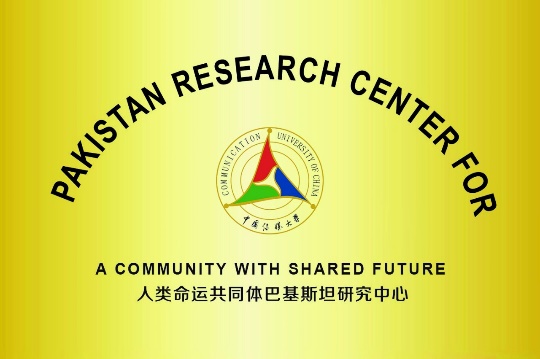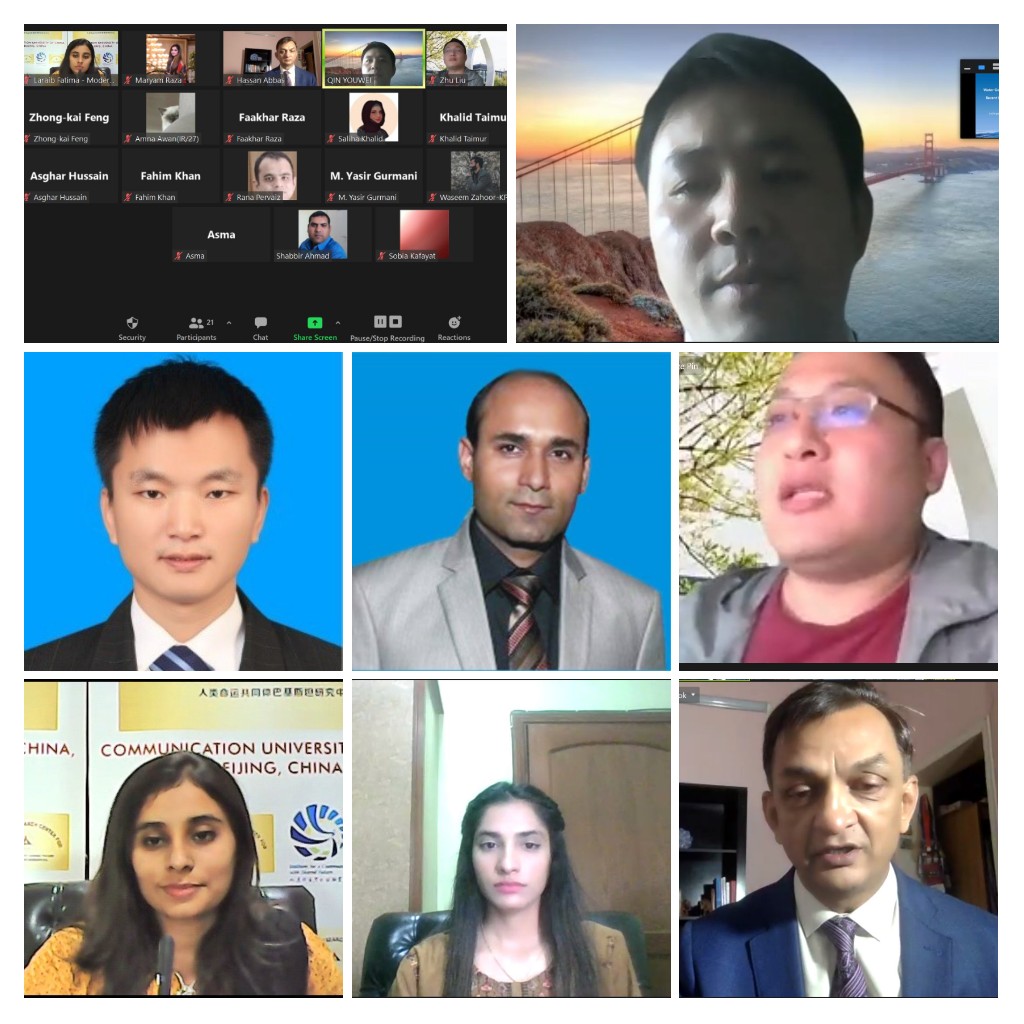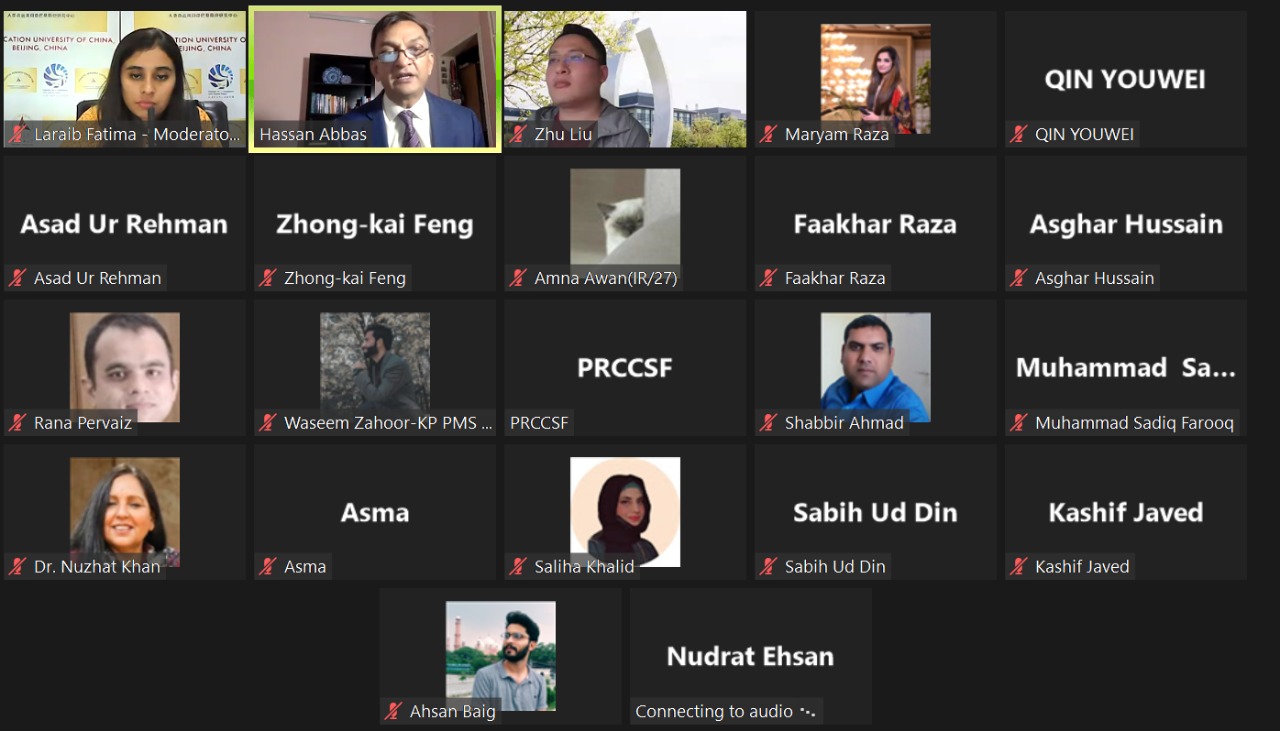
12th April 2022

On 12th April 2022, an online international conference on, “Understanding Water Governance and Management Strategies: Finding Solutions for Common Challenges” was organized by Pakistan Research Center for a Community with Shared Future.
The conference aimed to provide a premier interdisciplinary platform for relevant stakeholders and experts to discuss the most recent innovations, trends, and practical challenges in water governance existing in Pakistan and China.
The discussion commenced with the opening remarks of Ms. Maryam Raza, Deputy Director, Pakistan Research Center for a Community with Shared Future. She gave a brief overview of the center and its goals and highlighted that the conference theme holds a lot of significance in this period as rapid population growth, fast urbanization, increasing economic development, and climate change have led to a global water supply crisis. Thus, it is important to learn from our neighboring countries like China about their achievements in water governance and related sectors.
Prof. Youwei Qin, Associate Professor, Hohai University, Nanjing, China discussed China’s water governance and challenges: Recent developments and achievements. Prof Qin mentioned that due to the impact of climate change, Pakistan and China are at risk of droughts, floods, etc. It is difficult to deal with flood problems of rivers that are in the residential areas where a huge number of populations are living. China has efficiently dealt with this issue through flood control and disaster reduction in the mainstream of the river formed, and the important sections now can prevent the largest flood since 1949, China has also developed an early warning system to save the residential population from any natural disaster. He also shared that a large number of water conservancy projects have been completed and put into use like the Xiaolangdi reservoir, the yellow river, and the Three gorge project at Yangtze River. Discussing the problems, he stated that urban waterlogging becomes a problem in many cities in China, and this issue can also be seen in Pakistan as well. Highlighting the achievements of China, he mentioned that a water supply network system has been formed to utilize various water sources such as groundwater and surface water. He highlighted that due to measures taken the annual water supply has exceeded 600 billion m3.
Dr. Hassan Abbas, Chairman Forte, Integrated Water Resources Management discussed the impact of environmental change on water reservoirs. He also shared suggestions to deal with this issue. According to Dr. Hassan, large reservoirs are a typical 20th century model of managing rivers, they are insensitive to our ecological impacts. Large reservoirs are environmentally unsustainable, they don’t store enough water to fight droughts and they are not strong enough to deal with floods. Hence, there are several social, environmental, and other consequences when it comes to large reservoirs such as dams.He explained that we have to think of other solutions. We have very large and wide rivers running through plains, the average width is 6.3 km and the total area of this vast river corridor is about 21thousand square kilometers, and underneath there is a bed of sand containing fresh, pristine water. That water is our new source, and that is where our priority should be. He shared that Pakistan has conducted successful experiments with a soft moisture management system from which 50 to 70 percent of the water that we are currently using can be saved. He presented detailed diagrams and procedures of this system and stated that Pakistan must experiment with different systems to figure out which one suits best. Every area has different requirements, and multiple systems must be experimented within various regions. Through a comparative analysis, our experts can figure out economical and sustainable options for the best strategies for water reservoirs.
Dr. Zhu Liu, Associate Professor, Department of Hydrology and Water Resources, Hohai University, Nanjing, China shared his views on sustainable water resource management in China. He also discussed the concept of Sponge City in detail. He stated that a sponge city is designed for great resilience against environmental change and natural disasters, it infiltrates and saves water during rainfall and saves for reusing later, which results in making the water cycle more natural. Sharing other initiatives taken by China he discussed rainfall gardens, low elevation greenbelts, and green roofs as well. The Green roofs collect rainwater, purify it and also contribute to creating beautiful scenery. Dr. Zhu also discussed the concept of rain barrels, he highlighted that rain barrels capture water from a roof and hold it for later use such as lawns, gardens, or indoor plants.
Mr. Faakhar Reza, Director, Pakistan Council of Research in Water Resources (PCRWR), Regional Office Lahore discussed the Role of PCRWR in digitalizing the agriculture sector vis-à-vis water management, research & innovative projects. He commenced his presentation by giving a brief overview of the Pakistan Council of Research in Water Resources (PCRWR), its initiatives, and various steps taken by the center to ensure research and innovation in the water sector. He shared that PCRWR shares flow measurements of underground water and also contributes to real-time data sharing between provinces. Discussing the major achievements of PCRWR he highlighted that the center has researched and optimized high-efficiency irrigation systems, it has also introduced irrigation advisory to 20000 farmers in 43 districts of Pakistan through text messages. Moreover, it has also initiated on-farm tile drainage systems to control waterlogging and salinity. PCRWR has also developed many technologies like safe water sachets and chlorination tablets, hydraulic ramp pumps, and safe water filters at domestic levels.
Dr. Zhong-kai Feng Professor, College of Hydrology and Water Resources, Hohai University, Nanjing, China discussed China’s agriculture and water policy reforms. He also discussed how China can assist Pakistan in this sector. Discussing the problems of sustainable utilization of agricultural water resources, he mentioned that it has caused subsidence, water depletion, and groundwater recession. He suggested increasing the protection and conservation of agricultural water resources, improving the quality of rural water ecological environment, and improving water-saving awareness and legal system. He mentioned China has made great efforts and achieved success in addressing the water resources problems by using many effective engineering measures. He was of the view that the useful measures may provide comprehensive references for Pakistan’s agricultural and water policy reforms as well.

The conference was moderated by Ms. Laraib Fatima Hassan, Communication Executive, Pakistan Research Center for a Community with Shared Future, and was attended by 40 participants including students and experts from Pakistan and China.
Reported by PRCCSF
For more reports, please view following links:
Daily Mail International Conference on Water management strategies held | Daily Mail Pakistan
Gwadar Pro Pak-China experts discuss practical challenges in water governance
China Economic Net Pak-China experts discuss practical challenges in water governance--China Economic Net
